

Octopus card. The Octopus card is a reusable contactless stored value smart card for making electronic payments in online or offline systems in Hong Kong.
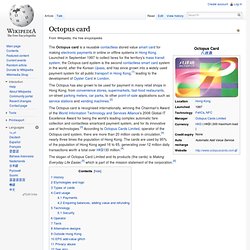
Launched in September 1997 to collect fares for the territory's mass transit system, the Octopus card system is the second contactless smart card system in the world, after the Korean Upass, and has since grown into a widely used payment system for all public transport in Hong Kong,[1] leading to the development of Oyster Card in London. The Octopus has also grown to be used for payment in many retail shops in Hong Kong, from convenience stores, supermarkets, fast-food restaurants, on-street parking meters, car parks, to other point-of-sale applications such as service stations and vending machines.[2] The slogan of Octopus Card Limited and its products (the cards) is Making Everyday Life Easier,[5] which is part of the mission statement of the corporation.[6] History[edit] Etymologies and logo[edit] Types of cards[edit] Card usage[edit] Payments[edit]
T-money. T-money T-money is a rechargeable series of cards and other "smart" devices used for paying transportation fares in and around Seoul and other areas of South Korea.
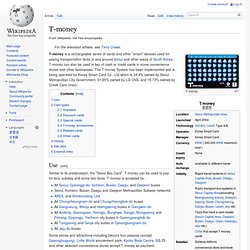
T-money can also be used in lieu of cash or credit cards in some convenience stores and other businesses. The T-money System has been implemented and is being operated by Korea Smart Card Co., Ltd which is 34.4% owned by Seoul Metropolitan City Government, 31.85% owned by LG CNS, and 15.73% owned by Credit Card Union. Use[edit] Similar to its predecessor, the "Seoul Bus Card", T-money can be used to pay for bus, subway and some taxi fares. Some stores and attractions including Seoul's four palaces (except Gyeonghuigung), Lotte World amusement park, Kyobo Book Centre, GS 25 and other selected convenience stores accept T-money as payment. Search Engine Land: Must Read News About Search Marketing & Search Engines. Microsoft Launches A New Loyalty Program: Bing Rewards. Prior Microsoft search loyalty programs, SearchPerks and Cashback, were retired.
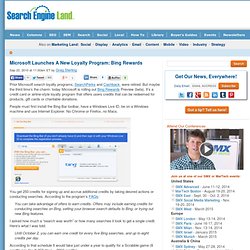
But maybe the third time’s the charm: today Microsoft is rolling out Bing Rewards Preview (beta). It’s a credit card or airline-style loyalty program that offers users credits that can be redeemed for products, gift cards or charitable donations. People must first install the Bing Bar toolbar, have a Windows Live ID, be on a Windows machine and use Internet Explorer. No Chrome or Firefox, no Macs. You get 250 credits for signing up and accrue additional credits by taking desired actions or conducting searches. You can take advantage of offers to earn credits. I asked how much a “search was worth” or how many searches it took to get a single credit. Until October 2, you can earn one credit for every five Bing searches, and up to eight credits per day.
According to that schedule It would take just under a year to qualify for a Scrabble game (8 credits per day X 358 days = 2866 credits). Busan Subway. The Busan Metro operated by the Busan Transportation Corporation is the metro system of Busan, South Korea.
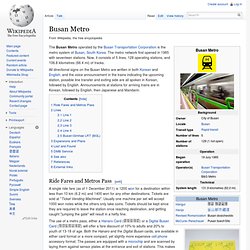
The metro network first opened in 1985 with seventeen stations. Now, it consists of 5 lines, 128 operating stations, and 106.8 kilometres (66.4 mi) of tracks. All directional signs on the Busan Metro are written in both Korean and English, and the voice announcement in the trains indicating the upcoming station, possible line transfer and exiting side are all spoken in Korean, followed by English.
Announcements at stations for arriving trains are in Korean, followed by English, then Japanese and Mandarin. Ride Fares and Metros Pass[edit] Busan Metro ticket A single ride fare (as of 1 December 2011) is 1200 won for a destination within less than 10 km (6.2 mi) and 1400 won for any other destinations. The use of a metro pass, either a Hanaro Card (하나로카드) or a Digital Busan Card (디지털부산카드) will offer a fare discount of 10% to adults and 20% to youth of 13-18 of age.
TiVo. TiVo (/ˈtiːvoʊ/ TEE-voh) is a digital video recorder (DVR) developed and marketed by TiVo, Inc. and introduced in 1999.
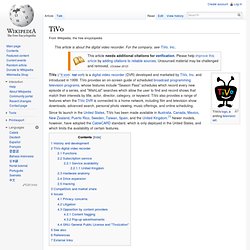
TiVo provides an on-screen guide of scheduled broadcast programming television programs, whose features include "Season Pass" schedules which record every new episode of a series, and "WishList" searches which allow the user to find and record shows that match their interests by title, actor, director, category, or keyword. TiVo also provides a range of features when the TiVo DVR is connected to a home network, including film and television show downloads, advanced search, personal photo viewing, music offerings, and online scheduling.
TiVo Box - Digital TV - Virgin Media.